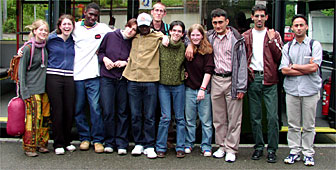Swiss organise refugee march in gesture of solidarity

Over 200 young Swiss, together with a similar number of refugees who have made Switzerland their home, have taken part in a cross-country "obstacle course" to mark the 50th anniversary of the signing of the Geneva Convention on refugees.
The project, called “escapeto.ch”, was organised by the Swiss Refugee Council to give participants an insight into what it is like to flee one’s home country and seek asylum in another.
Julien Jaeckle, project manager of escapeto.ch, told swissinfo that the refugees invited to take part had jumped at the opportunity. “We had no problem attracting refugees to come on board. Many of them were motivated to participate because of the chance it gave them to tell young Swiss people what they themselves experienced.”
Refugees from 50 different countries, including Turkey, Iran, Iraq and the former Yugoslavia, were invited to accompany the Swiss on the obstacle course.
Participants were divided into groups of four and told to assemble in Lausanne, Zurich or Basel. Each group, made up of two Swiss and two refugees, was then given instructions on how to reach Festland, an imaginary country just over the border.
Diplomatic channels were cut off before the groups left their starting points, and consular staff at a Festland Embassy informed all those taking part that their applications for asylum had been rejected.
Armed only with a series of envelopes which provided participants with clues about where to go and how to find a mysterious contact who would assist them in crossing the border illegally, the groups criss-crossed the country in a desperate bid to beat the authorities and find their way undetected to the frontier.
Members of the public were also invited to take part in the event by signing the travel documents of any groups with which they came into contact.
Anthony Levy, a tourist who found himself on a train with one of the groups, seemed impressed after hearing about the aims of the project. “It seems like a good idea to let young people experience what refugees go through,” he told swissinfo.
“People often think refugees are just wasters coming over to sponge, whereas it’s actually a daunting experience to come to another country. I think this event might make people more sympathetic to the refugee situation and help get rid of the stereotype.”
Zdenek Balas, a participant from the Czech Republic who now lives in Switzerland, said the success of the project lay in the opportunity it gave participants to engage in dialogue and share ideas and preconceptions about the circumstances of asylum seekers.
One of the most difficult aspects in the search for asylum, commented Balas, is the seemingly insurmountable language barrier. “When you can’t speak the language, it makes life really difficult,” he told swissinfo.
“You find yourself in situations where you need to explain something important, but you can’t express yourself – that’s one of the biggest problems refugees face.”
Balas also pointed out one way in which the escapeto.ch project could never be a realistic portrayal of the search for asylum.
“One of the overriding feelings for all refugees who leave their homes is fear about the future. And though I think this event is quite realistic, there’s no way you can really experience that fear if it’s just a simulation.”
By the end of the day, nearly 400 people had arrived safely in Festland, which turned out to be the main square in the Swiss capital, Bern. Many of those who had just completed the journey were convinced the event should be expanded to give more people the opportunity of meeting refugees living in Switzerland.
Maya Hirsch, a Swiss participant from Neuchatel, said escapeto.ch was an important step towards a greater understanding of the situation refugees face when leaving their home countries.
“In Switzerland, we don’t really accept refugees well, and so I believe everybody should make this journey in order to learn what it means to be a refugee.”
by Ramsey Zarifeh

In compliance with the JTI standards
More: SWI swissinfo.ch certified by the Journalism Trust Initiative
You can find an overview of ongoing debates with our journalists here . Please join us!
If you want to start a conversation about a topic raised in this article or want to report factual errors, email us at english@swissinfo.ch.